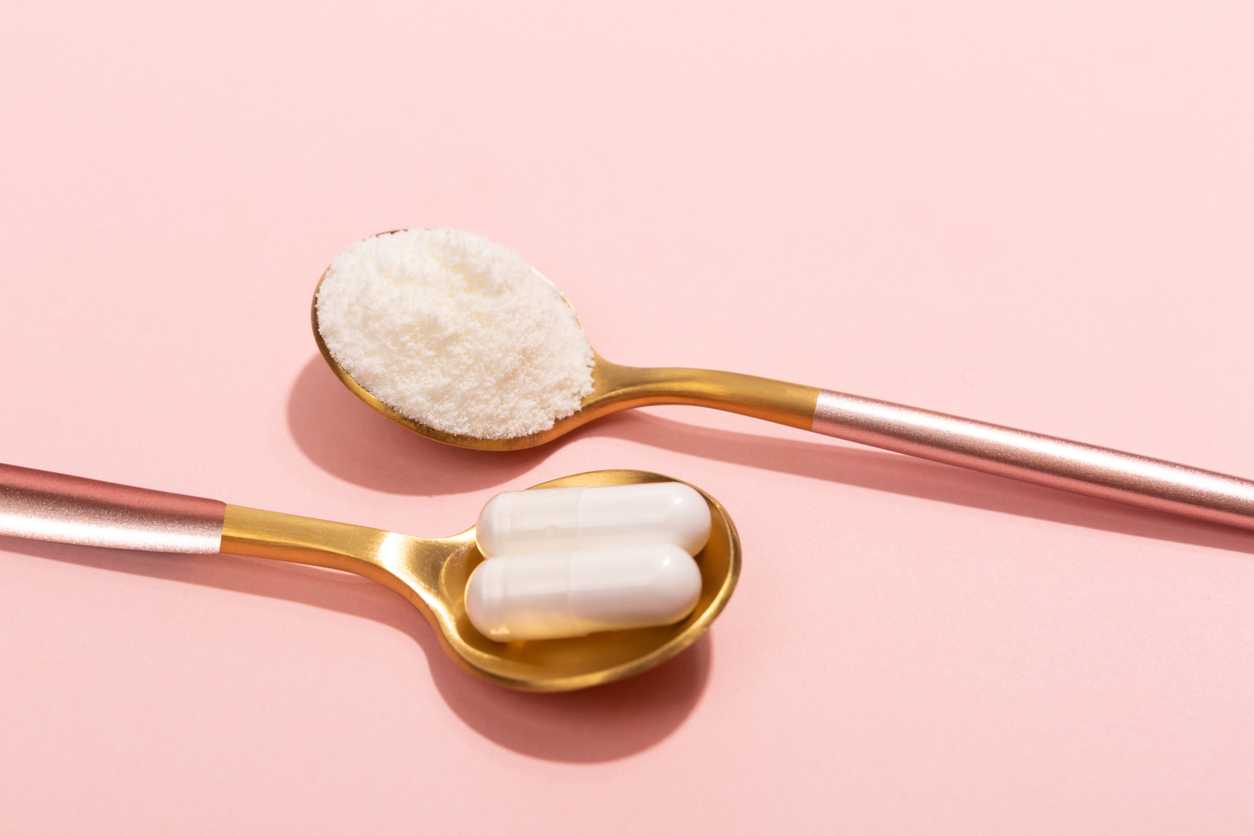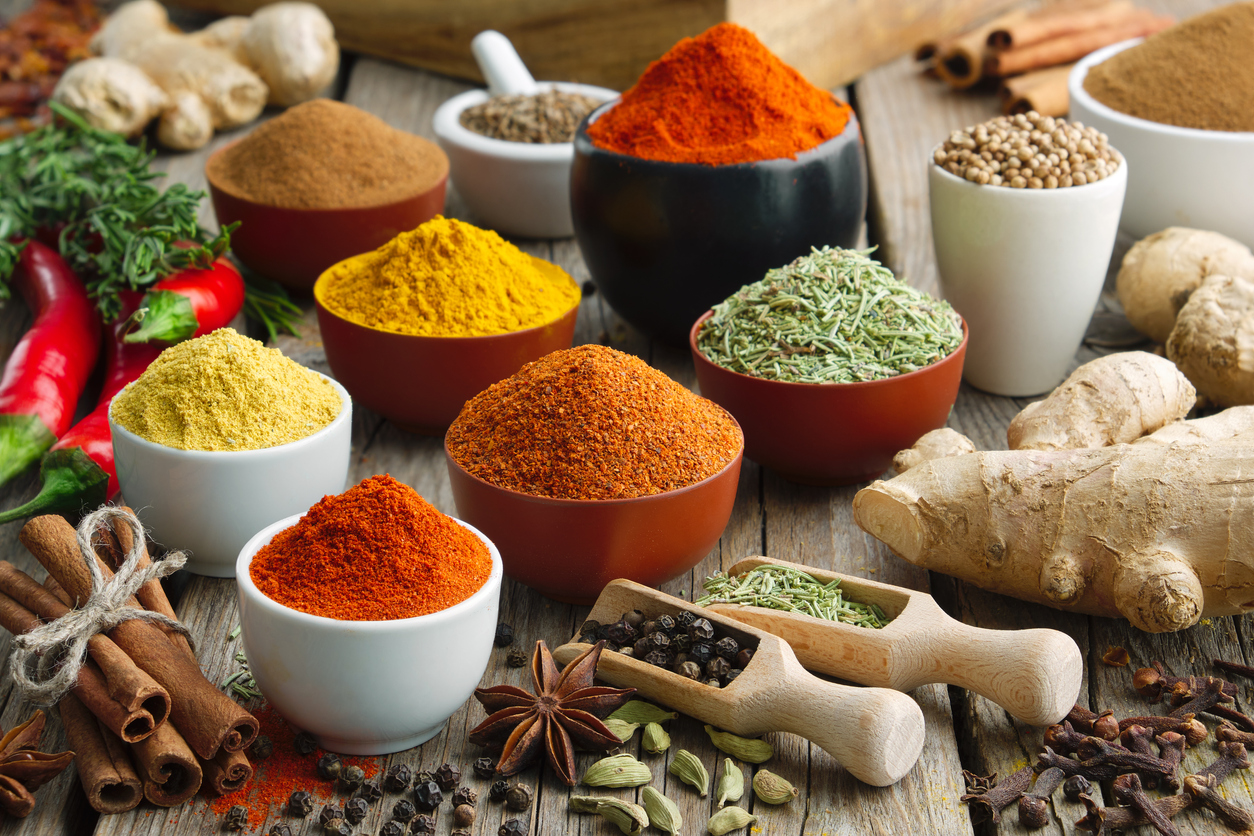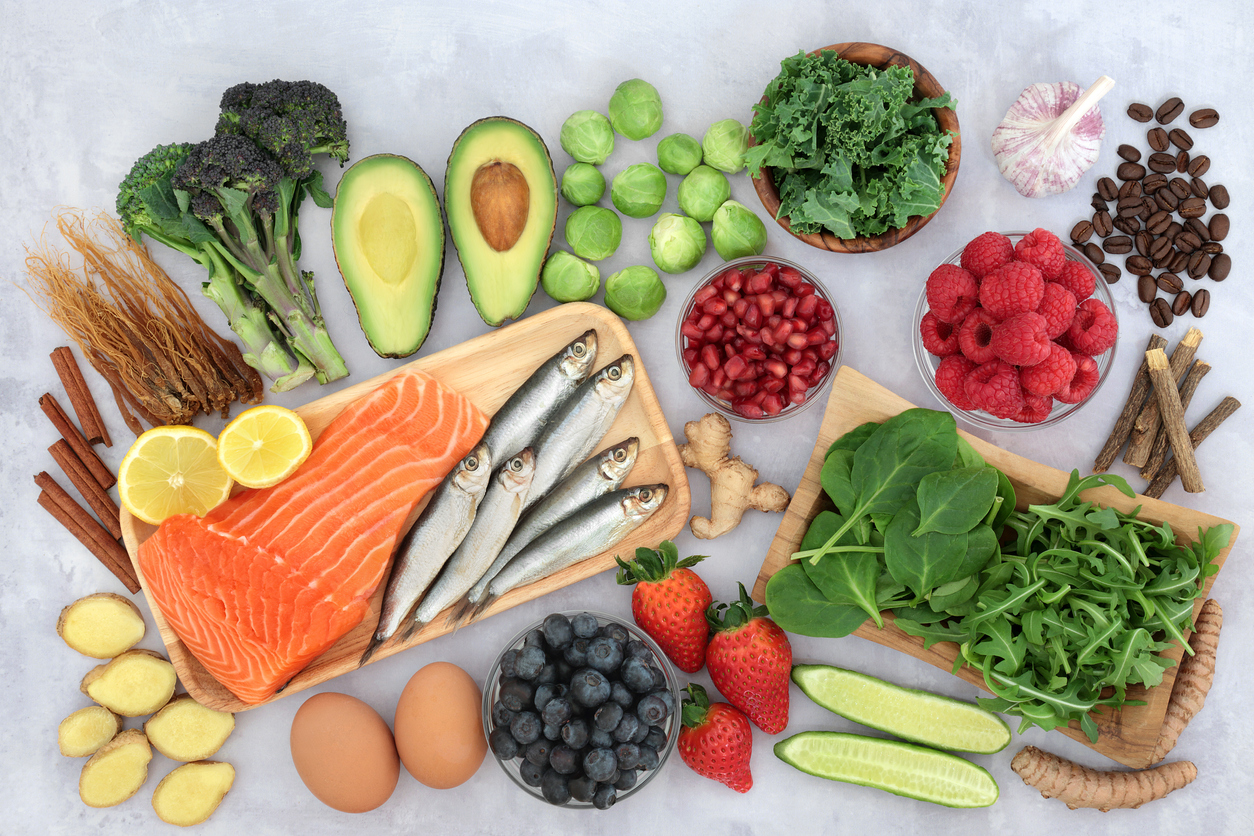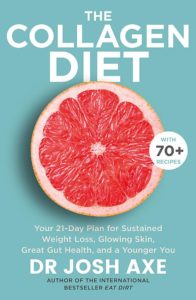Want to lose weight and get glowing skin? Join the club. Increasing your collagen intake might be the answer, says best-selling author Dr Josh Axe in his new book The Collagen Diet
With two best-selling books under his belt, Keto Diet and Eat Dirt, international wellness superstar Dr Josh Axe is back to reveal the untold mystery behind the remarkable protein, collagen.
Through various research studies and food plans, Dr Axe has pinpointed collagen to have invaluable benefits including weight control and clearer skin.
Having gone through his own personal journey with collagen after he found its benefits to improve his gut health and irritable bowel problems, he has since identified collagen to be the ‘missing link to modern health’.
So, what is collagen?
Collagen is a strong fibrous protein woven into your body’s thread of tissues, all inter-connected like one big fusion of wires.
‘Collagen is the glue that holds you together’, says Dr Axe.
Naturally found in our bodies, from skin to nails to bones, muscles, blood vessels and in lining of our gut, collagen is hidden everywhere throughout our bodies.
By the time you’re in your early fifties and above, research has shown that there is a significant decrease in the rate of collagen production by 75 per cent compared to those younger than thirty.
For a small substance it ranks highly for anti-ageing benefits which is why its found in so many beauty products promoting healthy and radiant skin.

Research has shown collagen can:
- Boost your immune system
- Strengthen your bones and muscles
- Prevent aches and pains associated with ageing
- Regenerate new tissue
- Maintain healthy hair and nails
- Aid with persistent gastrointestinal symptoms and food allergies/sensitivities
Lifestyle factors can play a key role in reducing your natural collagen levels, such as increased sun exposure, smoking, stress and poor gut health.
Besides these glorious benefits, it can also support weight loss and help you to achieve glowing skin.
How does collagen affect your skin?
Collagen being the strong fibrous protein that it is, helps to maintain your skin’s elasticity and springiness by working alongside the protein elastin which is found mainly in the dermis layer of your skin – that’s the toughest layer of your skin that helps keep tissue strong and flexible.
But as we age, these features unfortunately start to lose their benefits as your body’s natural collagen reserves start to decline from the start of your mid-twenties at a rate of one percent per year.
Before you know it by the time you’re in your early fifties and above, research has shown that there is a significant decrease in the rate of collagen production by 75% compared to those younger than thirty.

Lifestyle factors can play a key role in reducing your natural collagen levels, such as increased sun exposure, smoking, stress and poor gut health.
Although hard to resist, high sugar consumption is one of the main culprits in destroying your body’s natural collagen production.
This is because sugar molecules form products called ‘advanced glycation end products (or AGEs)’ which can stick onto collagen and elastin in your skin depriving it of its own healthy regeneration, causing wrinkles and saggy skin.
‘high sugar consumption is one of the main culprits in destroying your body’s natural collagen production
This can then increase your risk of developing inflammatory skin conditions such as acne or rosacea.
The rise in inflammation can then cause a decrease in the number of fibroblasts (the cells that produce collagen) and one of the reasons Dr Axe says consuming collagen through food or supplements can be a more effective method than through skin care products.
But what about fruit?
Although fruit contains sugar, these are natural sugars which consumed in moderate amounts can have beneficial effects to your skin and weight loss. ‘Consume one to three servings of fresh fruits daily (a serving is about half a cup)’ recommends Dr Axe.
Colourful berries such as blueberries, strawberries, raspberries and blackberries consist of plant-based nutrients called anti-inflammatory polyphenols that have antioxidant properties and are responsible for their deep blue, purple and red colours.
The benefits include reduced inflammation and increased protection against free radical exposure. A study found that participants that ate around 375 grams of blueberries had lower levels of stress markers and anti-inflammatory cytokines.
Other fruits include: cherries, grapes, avocadoes, olives, kiwi, pineapple, cranberries, and other citrus fruits.
3 ways to increase collagen production for glowing skin
#1 Collagen boosting supplements
It seems collagen supplements have a significant effect in boosting the quality of collagen, hence improving your skin’s ability to keep tissue intact and youthful.
In fact, multiple studies published in the Journal of the Science of Food and Agriculture, Nutrients and the Journal of the Science of Food and Agriculture, found the use of collagen supplements over a four to twelve-week period to be effective in improving skin hydration, elasticity and crow’s feet (the branching wrinkle that forms at the outer corner of a person’s eye).
This improvement is due to the stimulation of the collagen precursor, procollagen one (which is formed first in fibroblasts and then converted to collagen). This, in turn, increases the number of collagen-making fibroblasts.
Ingesting collagen supplements can also have benefits in helping to keep your skin’s collagen fibres in a functional and organised manner which is very important, since one of the red flags of ageing is a fragmentation of the skin’s collagen network, according to Dr Axe.

One piece of research published in the Journal of Cosmetic Dermatology found that oral collagen supplements reduced collagen fragmentation in the skin and increased collagen density in the dermis after four weeks as well as increasing skin hydration after eight weeks.
It could also help dimply skin on your legs too, according to a study published in The Journal of Medicinal Food . In it, 105 women were given a daily 2.5-gram collagen supplement which contained bio-active collagen peptides and noticed an improvement in the overall appearance of their moderately visible cellulite over a six-month period in comparison to the group given a placebo.
A hydrolysed fish supplement may also help (hydrolysation is a process that breaks down collagen into smaller pieces so that it can easily be absorbed by the body). In one 13-week trial published in Nutrition Research participants were left with greater elasticity in their skin compared with the control group who took a supplement that didn’t contain collagen.
Moreover, a more recent study published in the Journal of Ageing Research & Clinical Practice showed how consuming a specific type of collagen, type one collagen increased the firmness of women’s skin aged between 46 to 69 whilst also decreasing the appearance of crow’s feet.
How to choose the correct collagen supplement
When scanning shelves for the best collagen supplements Dr Axe recommends looking out for these five important factors in your checklist:
#1 Hydrolysed collagen or collagen peptides?
Both of these substances are pretty much the same thing, but different supplements may state either one. The point to make here is that they both undergo hydrolysation which breaks down collagen molecules into smaller ones for easier absorption.
Hydrolysed collagen peptides also have a lower molecular weight making it quicker to dissolve into any liquid. ‘You can throw a scoop or two in your morning coffee or smoothie, or add it to soup or stew’ suggests Dr Axe.
#2 Products that contain a range of collagen types
Type one collagen is the most abundant type so it is essential that this is noted in any collagen supplement you take. But what is also important is that the product has an amino acid balance of all the five types of collagen. So Dr Axe advises a multi-collagen supplement that has: bovine collagen, chicken collagen, fish collagen and eggshell membrane collagen.
#3 Bone broth protein powder and bone broth collagen powder
Hydrolysed multi-collagen protein is great for building collagen but bone broth collagen has additional benefits as it contains glucosamine and chondroitin which helps with arthritis and aids in joint pain- so you might find a bone broth supplement wins from the two but it all depends on your collagen needs.
#4 Make sure the type of collagen is specified on the label
If the types are not listed than you don’t know what you’re getting yourself into, so best to avoid.
#5 Check the dose
Dr Axe advises taking 10 to 30 milligrams a day. You can take more especially if you are on a collagen-loading program or looking to use collagen as a tool to improve any collagen deficiencies. ‘However, if the label recommends a super-high quantity, I’d be wary, assorts Dr Axe.
#2 Collagen boosting herbs and spices
These can increase your collagen production through their anti-inflammatory and antioxidant properties, says Dr Axe.

Dr Axe’s favourite three are:
- Turmeric: This Holy Grail of spices is great for fighting free radical damage from environmental irritants such as UV light and pollution. It contains the active ingredient, curcumin, shown in a study published in the International Journal of Molecular Sciences to assist in collagen formation and the transportation and replication of fibroblasts. It is also effective in reducing inflammation in the wound healing process and help prevent loss of moisture in the skin.
- Cinnamon: A cinnamon cinnabon maybe? Sadly, no (too many refined carbs). But the active ingredient in cinnamon powder, cinnamaldehyde, has been shown in research published in the Journal of Agricultural and Food Chemistry to promote type one collagen formation, which makes up more than 90 percent of the collagen in your body and is essential for skin strength and regeneration.
- Ginger: A powerful antioxidant bursting with flavour works like turmeric in reversing skin ageing by fighting free radicals. Interestingly, research in Wound Repair and Regeneration found that when combined with curcumin, it can aid the wound healing process and promote collagen production.
#3 Collagen boosting ancient superfoods

- Ginseng: This powerful anti-inflammatory and antioxidant may help with glowing skin too as research in the Journal of Ethnopharmacology showed the panax ginseng root extract to activate the production of type one collagen by generating a protein that is important for its production. Ginseng can be taken as a supplement or eaten raw by adding fresh slices to hot water and allowing to soak for several minutes.
- Amla berry (aka Indian gooseberry): A study published in the Journal of Ethnopharmacology revealed that Amla berry extract can help increase the energy activity of fibroblasts and promote the production of procollagen. You can find these fruit in your supermarket or it can be taken in powder form from Biovea. Scoop a spoonful with your juice, yoghurt or favourite smoothie.
- Dong quai: This traditional Chinese herb, also known as female ginseng, has been shown in research to decrease inflammation and blood sugar spikes, two key factors which drive anti-ageing. This herb can be taken as a tea or powder.
- Astragalus: This is another popular Chinese herb known for its anti-ageing benefits as new research has discovered that it stimulates hyaluronic acid (a natural moisturiser) production in the skin. Dr Axe says ‘hyaluronic acid in the skin binds with water to retain moisture and protect collagen’. You can get astragalus as a powder, loose herbal tea or tablet form from Solgar.
How can collagen help with weight loss?
Often weight loss can lead to more sagging skin. But adding collagen to your diet can protect your muscle tissue as you shed pounds – and help you keep the weight off for good, asserts Dr Axe.
Collagen has an exclusive ability to help maintain lean body mass whilst you lose fat as well
Research published in the American Journal of Physiology- Regulatory, Integrative, and Comparative Physiology found that rats given a diet high in glycine (an anti-ageing building block found in collagen) were protected from accumulating fat in the abdominal area.
The study also showed the rats were able to break down fat at a higher rate, implying the role of collagen may affect your weight in a positive way by also heavily reducing your risk of developing serious diseases associated with extreme weight gain such as diabetes and heart disease.
Maintaining muscle mass
When you’re losing weight, you can often lose muscle along with the fat. Not only can this slow your weight loss efforts, it can also be detrimental to your metabolism because muscles burn a lot more calories than any other tissue in your body. That can often result in weight loss plateaus. On the other hand, collagen has an exclusive ability to help maintain lean body mass whilst you lose fat as well.

A study carried out at the University of Melbourne showed that mice given glycine (found in high amounts in collagen) in a calorie-restricted diet had increased protection against muscle loss and accelerated fat loss.
A low-carb, low-sugar diet rich in collagen, is the best way to reduce the deep fat that surrounds the organs in your belly known as visceral fat
Glycine not only helps to break down fat, it also allows cells to use this breakdown as energy, which is beneficial when trying to lose weight and trying to maintain your energy levels.
Collagen rich foods for weight loss
A low-carb, low-sugar diet rich in collagen is the best way to reduce the deep fat that surrounds the organs in your belly known as visceral fat – this is the kind of fat most often found around the middle of the body.
This kind of fat can put pressure on your collagen-rich tissues such as those found in knee and spine cartilage, causing collagen production to diminish at a quicker rate than normal.
High levels of this abdominal fat can also cause a spike in inflammatory cytokines, which are proteins that promote inflammation, leading to a greater chance of developing inflammatory diseases such as type 2 diabetes and high blood pressure. These proteins can also damage your natural production of collagen too.
The foods to avoid which increase inflammation, destroy your collagen production and also reduce the quantity of collagen in your body are:
- Refined carbs such as crackers, cereal, pasta, bread and cookies.
- Processed meats such as, ham, sausages, bacon which include nitrates and other chemicals that also give rise to inflammation
- Fried foods
- Fizzy drinks and sweetened beverages

To achieve a diet high in collagen and anti-inflammatory whole foods pack your meals with the following:
- Brightly coloured vegetables such as butternut squash, asparagus, broccoli, carrots, bell peppers and sweet potatoes
- Dark leafy greens such as kale, spinach and bok choy.
- Fermented foods and vegetables such as kombucha, kefir and tempeh
- Free-radical fighting fruit such as cherries, grapes, avocados, kiwi and apples
- Pasture-raised poultry such as chicken or turkey. A 100 gram ounce serving provides 21 to 24 grams of protein
- Plant proteins such as legumes, nuts, beans and whole grains, especially if your vegan or vegetarian
- Oils such as coconut or extra virgin olive oil
- Bone broth (either chicken, beef or fish)
- Wild caught salmon fillets

For more life-changing benefits of collagen including how it can improve your gut health then be sure to purchase his detailed book The Collagen Diet packed with a 28-day collagen diet meal plan with over 70 mouth-watering recipes.
Relevant Healthista Content:
The beauty diet – 5 ways to eat for glowing skin
8 healthy recipes for glowing skin
Want to lose weight? Meet the trainer who says you’re probably not eating enough
Need a protein powder for weight loss? Look for these 6 ingredients
More Healthista Content:
30 day fat-burning home workout challenge- Day Three
How to find love – the therapist’s guide
30 day fat-burning home workout challenge – Day Two
How to spot a sexual predator – the 8 characteristics
Like this article? Sign up to our newsletter to get more articles like this delivered straight to your inbox.





















































